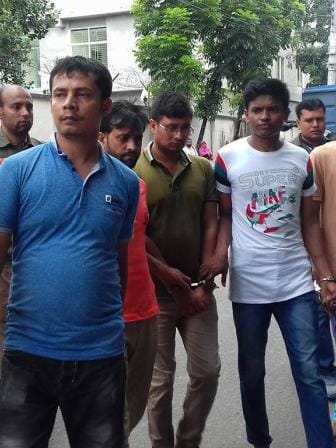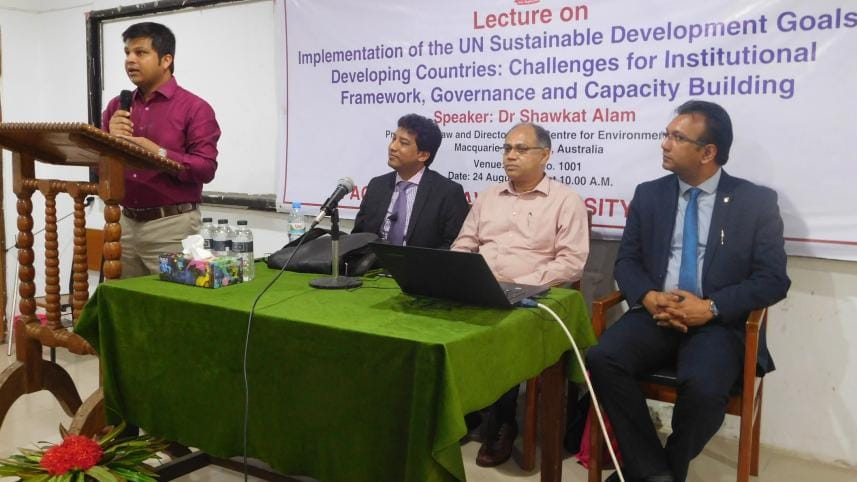From the shores of hell & back
The stories of 157 Bangladeshis who were exploited and extorted in Libya enroute to Italy

Abdul Latif managed to give his family the shock of their lives last week. After remaining traceless for more than four months in Libya, the 35-year-old returned home last Friday night. His children ran towards him, screaming at the top of their lungs; his wife broke into tears before giving Abdul a long hug, soon after he entered his residence in Bagerhat.
"They thought I was dead," Abdul tells Star Weekend. "I was stuck in a jail in Libya for over four months and I never had the chance to contact my family. They thought I had fallen from the boat [on the way to Italy from Libya] into the dangerous sea and disappeared forever," he says.
"I have learnt my lesson. My dream to go abroad has been quashed. The time I spent in jail was horrific. In the four months that I was there, I didn't get to eat a single morsel of rice. My health has deteriorated significantly.
"But what hurts me more is to see the condition of my wife and my children. They couldn't eat or sleep in peace for the last four months. They look as bad as me," says Abdul.
He is one of the 157 Bangladeshis who returned from Libya on September 26. The International Organisation for Migration (IOM), along with the Ministry of Foreign Affairs, worked on rescuing Bangladeshis from various jails in Libya and sending them home on a flight last week.
Star Weekend spoke to a number of these returnees who explained in detail how the syndicate of dalals (middlemen)—both here and in Libya—deceived, exploited, and extorted every penny out of them, in their dreams of reaching Europe. One of the most concerning aspects according to researchers is that a large number of the recent returnees are young people aged between 20 to 30.
***

Mohammad Abdul Kader completed his Bachelors in Business Administration from a reputed private university in 2017. His family had spent close to seven lakh taka for his education and they also had the means to send Kader abroad for higher studies. Instead, Kader ended up being caught in the dream of a life abroad under the influence of a dalal, he met during one of his addas in Rayer Bazar.
"Nazrul and Shahin [the dalals] brainwashed me. And that's the reason why I am a loser today. They told me that all I had to do was pay Tk 10 lakh and I would get a good job in Italy. Everything was set," recalls 27-year-old Kader.
Kader was given transit visas for Dubai and Oman. From Oman, he took a Turkish Airlines flight to Libya. "My dalal had given me a sticker visa for Libya, which I later realised was fake. I still managed to get through though," says Kader.
Upon reaching Libya, Kader was taken to his contact point: Bashar. As soon as he reached the house, Bashar's men took away his passport and his mobile phone. According to the deal made in Dhaka, Bashar was supposed to handle Kader's 'game.' "In Libya, 'game' is a word that is used to explain the act of taking someone from Libya to Italy through the sea on a rubber boat," explains Kader.
To Kader's surprise though, Bashar told him that he wouldn't be able to send him to Italy for another three months, because of increased security at the border. "He then asked me to call my parents and tell them to send another Tk 2.5 lakh to a dalal in Dhaka. He said that that would be the cost for me to stay at his place for three months. When I protested, his men beat me up," he adds.
" Abdul Latif
managed to give his family the shock of their lives last week. After remaining traceless for more than four months in Libya, the 35-year-old returned home last Friday night. His children ran towards him, screaming at the top of their lungs; his wife broke into tears before giving Abdul a long hug, soon after he entered his residence in Bagerhat.
For the next two-and-a-half months, Kader remained locked at Bashar's place. "I kept on begging him to let me go. He got his money after all. But he had ill intentions. He wanted to sell me to someone else and make more money in the process. After staying at Bashar's for three months, I was sold to a Bangladeshi called Ripon who hails from Manikganj for two lakh taka," says Kader.
"Ripon treated me very nicely on the first day. He called me his brother and sympathised with me. He gave me very good food as well. After that, he gave me his phone and asked me to arrange for another two lakh taka.
"He said that the Libyans at his place would kill me if I didn't ask my parents to pay up. But I knew it was a lie and it was he who wanted the money. When I protested, I was beaten up again. For the next two days, he stopped giving me any food," recalls Kader.
After two days of torture, Kader broke down and asked his mother to pay the money to Ripon's men in Bangladesh. His mother wasn't allowed to use Bkash or any other kind of digital transfer. She had to pay Ripon's men in Bangladesh in cash directly.
Finally, Kader got a chance to board the boat to Italy. He was put on a rubber boat with 170 other people, including 38 Bangladeshis. The 13-hour ride to the border of Italy was, according to Kader, the most dangerous journey that he had ever taken.
"Firstly, the boat was overcrowded. I was sitting on the pipe at the edge of the boat and the waves were strong. There were two other boats that left with us. I saw three people fall into the sea from another boat and get swept away in the dark," recalls Kader. "I would have fallen off as well. I was sleepy and was dozing off. Luckily for me, another Bangladeshi held onto my leg," he says.
In the morning, Kader's boat reached zero point. An Italian ship and a helicopter had come to receive them and direct them towards the dock. However, at that very moment, a Libyan Navy ship came over and intercepted the boat that Kader was in. Everyone on that boat was sent back to a deportation jail in Tripoli.
Kader was in jail for a couple of months, and the dreadful experiences that he had to go through in the prison haunt him to this day.
"The police asked us to give them whatever money we had and submit our mobile phones. They said that they would give the money back when we left, but that was obviously a lie. Some of us were stripped naked. They even touched our private parts to see whether we hid any money," says Kader.
The 38 Bangladeshis were separated from the rest of the crew and were kept in a five feet by 20 feet room, which looked more like a storage room according to Kader.
" Md Minhaj Matobbor, 21
The brokers there beat us with PVC pipes. I am back home now but I still can't walk properly. I barely have the energy to speak. Amidst all this, the dalal who tricked me and sent me to Libya has built a new building in his village. Will there be no justice?
"38 of us were squeezed in there everyday and they would pull down the shutter. It was hard to breathe inside that place, so we would take turns and put our nose in the small gap that was there between the shutter and the ground.
"We barely got food. They used to give us a kind of bread everyday that never filled our stomachs. We had a bucket of drinking water in the room that was refilled every two days.
Many of us were scared to even drink water because there wasn't any toilet in the room. We would be given just 10 minutes everyday to go to the bathroom and only five of us were allowed to go at a time. So, it was impossible for all of us to use the bathroom everyday," describes Kader.
"One of the murobbi's (an older Bangladeshi) stomach got upset. He couldn't wait till the bathroom break and ended up soiling the bucket of water. We couldn't drink any water the whole day," Kader adds.
After staying in jail for two months, Ripon, Kader's dalal, managed to get Kader out of jail and took him to his house. This time Ripon got Kader a job. He worked at a confectionary for six months before getting an offer from Ripon's partner to take a boat to Italy again. "There were many Bangladeshis over there who act as dalals. It's their business," explains Kader.
Kader accepted the offer and asked his mother to pay Ripon's partner Tk 120,000 more. Soon, Kader was taken to the ghat from where the boat was supposed to depart. He stayed there for a week before the police arrived, arrested him and prevented his 'game'. This time he was taken to a safe house run by the IOM, after which he was eventually sent back home.
Today, Kader feels helpless and desperately wants to file a case against the dalals who had instigated his trip. However, they are nowhere to be found. "All I wanted was to lead a good life. But what I got in return is a lot of pain. My mother had to sell all her jewelry because of me. I wasted around Tk 15 lakh," says Kader.
***
According to Shakirul Islam, chairman of Ovibashi Karmi Unnayan Program, a migrant-based research organisation, young people like Kader are specifically targeted by dalals in the country because of their vulnerability.
"Based on our research we have seen that from 2017, most of the Bangladeshis who went to Europe were between the age bracket of 18 to 25. It's obvious that they were targeted intentionally," explains Shakirul.
CR Abrar, professor at the University of Dhaka, opines that the lack of opportunities for the youth in the country is only making it easier for brokers to brainwash them.
"This is on record that the GDP is increasing, but not job opportunities.
" Mohammad Saidul Kandi, 35
On the night that I was supposed to get on the boat to Italy from Libya, I was very scared. The currents were very rough and the boat was overcrowded. I told my driver that I don't want to go. He put a gun on my chest and forced me to get on the boat. It was dangerous. After traveling for 17 hours, the Libyan coastguard caught us and sent us back.
Those who brainwash these people, do so in such a way that they have no other option but to take the bait," says Abrar.
As such, it's not a surprise that there are a few among the 157 returnees who want to go abroad again, despite being cheated. 22-year-old Shahnewaz Khan is one of them. He paid a dalal eight lakh taka to go to Italy via Libya. He was, however, beaten up with PVC pipes, sold and resold in Libya before the police came to his rescue.
"I feel like I need to go outside again and earn money. If I could have gotten a loan here, then I could have started a business. But that's not happening. My education background isn't too good either. I have no other option," explains Shahnewaz.
Giorgi Gigauri, chief of IOM mission in Bangladesh, explains that they are up against very 'powerful criminals.'
"For at least a decade, we have been working on evacuating Bangladeshis out of Libya… migrants are still going through Libya trying to get to Europe," he says. "There is something about the information given to people that the human mind only processes selectively… for some reason,the brain will process the one good story and will ignore the thousand bad stories," Gigauri tells Star Weekend.

"There are very powerful criminal elements at play here—smugglers and traffickers who are basically modern-day slave traders and make millions. They prey on the most vulnerable," he adds.
***
Problems also lie in their reintegration into society. Government agencies mainly focus on the physical injuries of the migrants and till date, lack a policy to focus on the psychosocial counseling of these victims.
A number of the victims who returned from Libya last week told Star Weekend that they have no clue as to what their next plan of action would be. Most of them are being pressured to return the borrowed money. Many of them broke down in tears while talking of their experiences in Libya.
21-year-old Mannan Kazi says that he begins to shiver whenever he thinks about his days in Libya. Even though he has returned home, he can't eat properly.
"After returning to Bangladesh, my parents took me to a doctor. I got on a weighing scale and realised that I had lost almost 20 kilos. I was 65 before going to Libya. My parents started crying at the sight of my weight," says Kazi
" Moksed Mamun, 22
It was a team effort. The Bangladeshi dalals there would talk to us and threaten us for money, and then they would send the Libyans to come and beat us up. They tortured us in a very organised manner
"My situation is very bad. My family lost all its money because of me. My family also had to take a loan just to take me to the doctor. My chest pains every time I think about the days to come," he laments.
Kazi had gone to Libya last year along with his cousin's husband Tofail. Like many other Bangladeshis, he too was cheated and sold and resold a number of times. According to Kazi, Tofail's father suffered a stroke and died soon after he was told that his son was trapped in Libya and that they needed to send more money.
***
Researchers believe that the government hasn't been doing enough to solve this crisis.
When the Director General of the Wage Earners Welfare Board, Gazi Mohammad Julhash, was asked regarding the 157 Bangladeshis who arrived last week, he said: "IOM brought them. We just went to the airport and received them. I am not really aware about how they went to Libya or what they did there, we just received them at the airport."

" Yousuf Molla, 26 I think even people who are given death sentence in Bangladesh live better lives than those who are jailed in Libya. The way they tortured us was despicable. People were even kidnapped by the mafia from the jail.
The inadequate implementation of the Prevention and Suppression of Human Trafficking Act has only made things worse. There have been at least 4,152 cases filed under the trafficking act. However, the number of convictions is just around 10 to 15 per year. According to the Bangladesh Counter Trafficking-in-Persons, of the 778 trafficking cases filed in 2017, only one witnessed a successful conviction.
These are numbers that can definitely hurt Bangladesh. As Shakirul puts it: "Bangladesh is currently in Tier 2 (Trafficking in persons report). We could not do much last year. Not a lot of cases have been filed and there haven't been many convictions. There is a chance for us to go below tier 2 and that is just a shame."
Comments